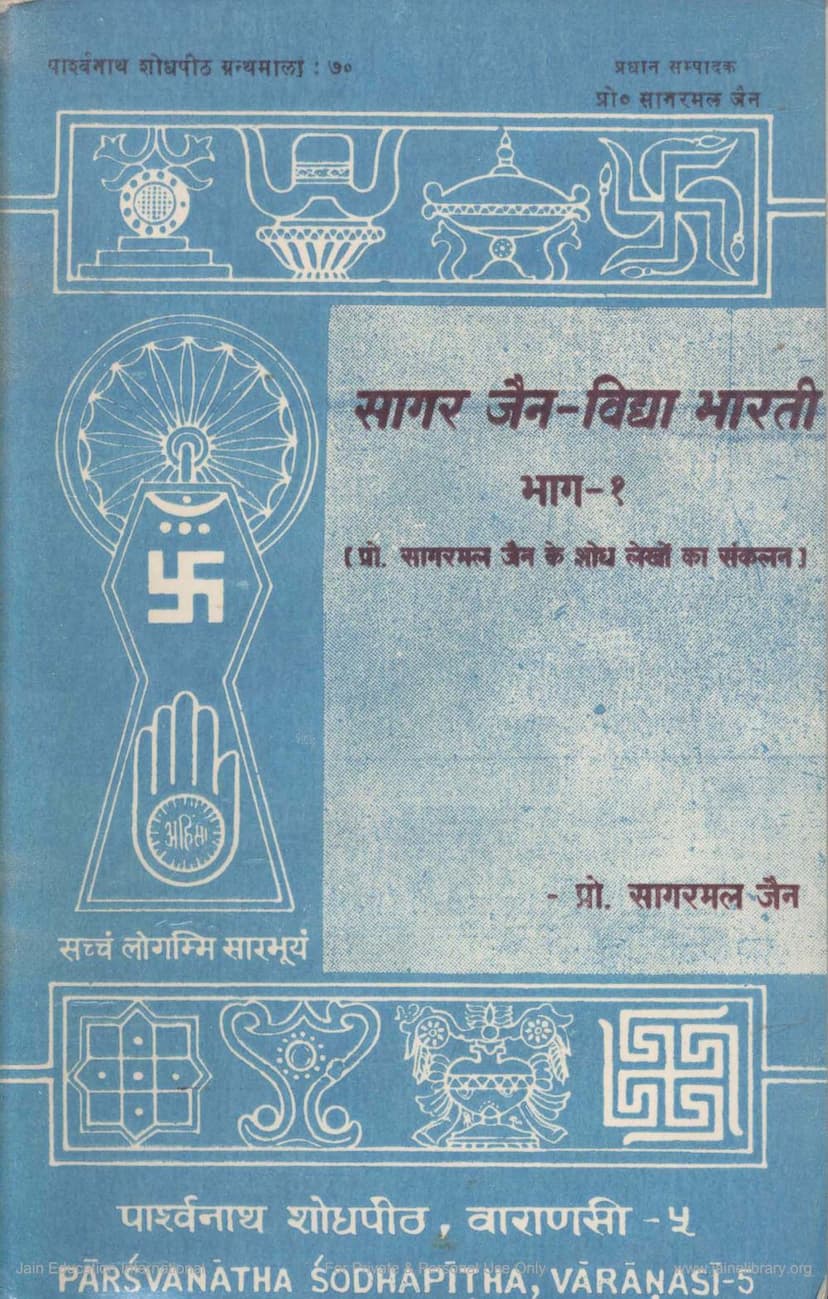Sagar Jain Vidya Bharti Part 1
Added to library: September 2, 2025

Summary
Here's a comprehensive summary of the provided Jain text, "Sagar Jain Vidya Bharti Part 1," authored by Sagarmal Jain and published by Parshwanath Shodhpith Varanasi, based on the scanned pages:
Book Title: Sagar Jain Vidya Bharti Part 1 Author: Prof. Sagarmal Jain Publisher: Pujya Sohanlal Smaraka Parsvanatha Sodhpitha, Varanasi Year of Publication: 1994 (First Edition)
Overall Scope: This volume is a collection of research articles by Prof. Sagarmal Jain, a prominent scholar of Jainology. The publisher, Parsvanatha Shodhpith, aims to compile and publish all of Prof. Sagarmal Jain's significant academic works, which are estimated to span approximately ten volumes and around three thousand pages. This first volume serves as an initial step in this ambitious project, bringing together some of his essays written for various journals, books, and seminars over the past year.
Key Themes and Content: The book covers a wide range of topics within Jain philosophy, religion, history, and culture. Based on the table of contents, the essays delve into:
-
Foundational Concepts of Jainism:
- The core essence of Jain Dharma and Philosophy.
- The concept of devotion in Jainism.
- The meaning and significance of Swadhyaya (self-study) in Jainism.
- Meditation in Jain practice.
- The doctrine of Karma and its analysis.
- Jainism and social equality.
-
Mahavira and his Teachings:
- The life and philosophy of Lord Mahavir.
- Reconsidering the date of Lord Mahavir's Nirvana.
-
Jainism in Wider Contexts:
- The integrated form of Indian culture.
- Environmental pollution and Jainism's perspective.
- Jainism and social equality.
- Valuable education in Jain Agamas and their relevance today.
- The syncretic and tolerant perspective of Jain scholars in Khajuraho art.
- A critical review of Pandit Rahul Sankrityayan's views on Jainism.
- Rigvedic hymns related to Arhat and Rishabhvachin.
- A re-examination of Niryukti literature.
- The problem of defining and translating Jain and Buddhist technical terms.
- Linguistic changes in Jain Agamas.
-
Biographical Information:
- A significant portion of the book is dedicated to a detailed biography of Dr. Sagarmal Jain, highlighting his life journey, education, marriage, family and social activities, academic pursuits (including his MA and PhD), and his professional career as a professor. It emphasizes his humble beginnings, his dedication to study despite business and family responsibilities, and his eventual dedication to Jainology. It also details his philosophical and scholarly influences and his contributions to various institutions.
Prof. Sagarmal Jain's Approach and Contributions: The preface by Bhupendranath Jain highlights that Prof. Sagarmal Jain's essays are not merely topical but of timeless importance. His writing is characterized by a departure from sectarian bias and a focus on intellectual honesty and truth-seeking, a style he learned from prominent scholars like Pt. Sukhlalji Sanghvi and Pt. Dalsukhbhai Malvania. The volume showcases his extensive research, rigorous analysis, and broad understanding of Jain traditions and their interconnections with other Indian philosophical and cultural streams. His work is recognized for its profound insight and scholarly depth.
Compilation Project: The "Sagar Jain-Vidya Bharti" project, envisioned to be published in approximately ten volumes, aims to make Prof. Sagarmal Jain's vast body of work accessible to readers in a consolidated format. This first volume is a testament to that commitment, providing a foundational collection of his significant contributions to Jain scholarship.
In essence, "Sagar Jain Vidya Bharti Part 1" is a foundational volume in a larger project to showcase the extensive and insightful research of Prof. Sagarmal Jain on various facets of Jainism. It highlights his dedication to preserving and propagating Jain knowledge, his critical yet respectful approach to scholarship, and his ability to connect Jain principles to contemporary issues.